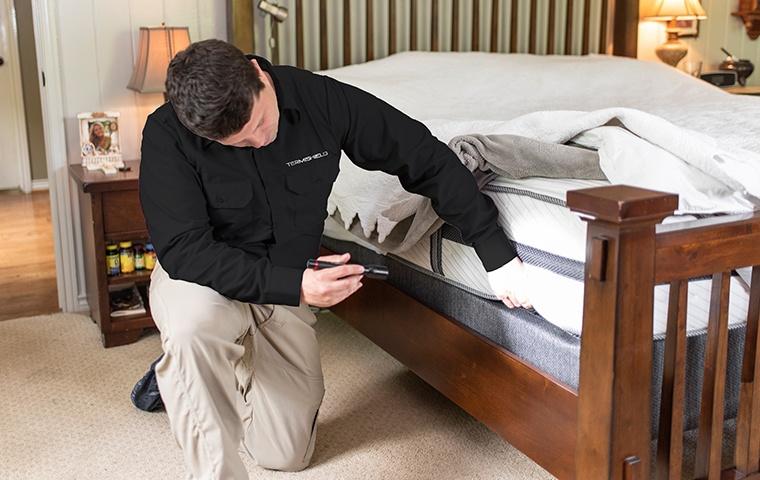A Failure of the Various Types of Pest Control Solutions
In the realm of parasite control, a wide range of techniques exist to deal with and combat the existence of undesirable animals. From the conventional usage of chemical pesticides to a lot more cutting-edge biological control options, each strategy uses distinct advantages and limitations. As we navigate through the varied landscape of insect control services, understanding the complexities of each method ends up being paramount in establishing the most reliable strategy. Remain tuned as we check out the nuanced world of bug control strategies and find just how each type plays an one-of-a-kind duty in securing our atmospheres.
Chemical Pesticides
Chemical chemicals are frequently made use of in parasite control to effectively get rid of a wide variety of bugs and various other pests. These chemicals work by targeting the nerve system of the insects, disrupting their normal functions, and inevitably resulting in their demise. Making use of chemical pesticides has been a staple in the insect control sector for years as a result of their effectiveness and quick outcomes.

Nonetheless, it is important to make use of chemical pesticides with caution because of their prospective damaging impacts on the atmosphere and non-target species. Incorrect application or overuse of these chemicals can bring about pollution, injury to useful pests, and resistance development in bug populaces. Consequently, it is important to follow safety and security guidelines and regulations when utilizing chemical pesticides for bug control.
Biological Control Approaches
Thinking about the possible ecological effects and dangers connected with chemical pesticides, organic control methods use an even more sustainable approach to taking care of pest populations. Organic control entails using natural adversaries, such as parasites, virus, and predators, to reduce insect populations. This approach is often much more targeted, affecting just the details parasite varieties while reducing injury to valuable pests, humans, and the atmosphere.

Once established, natural enemies can help control pest populaces constantly without the requirement for repeated applications of pesticides. Furthermore, biological control is typically a lot more economical and can help reduce chemical resistance in pest populaces over time.

Mechanical Insect Control
Mechanical bug control entails the physical control or elimination of bugs to handle their populations properly. One common instance of mechanical bug control is utilizing catches to catch bugs or rodents.
One more mechanical approach is making use of obstacles such as screens, nets, or fences to obstruct insects from getting in certain locations. By physically avoiding parasites from accessing a place, the likelihood of invasions or damages can be substantially reduced. Additionally, hand-operated methods like handpicking parasites off plants or structures can be effective for smaller-scale infestations.
While mechanical insect control techniques can be labor-intensive, they use a non-chemical option that can be sustainable and ecologically friendly. By targeting parasites straight, mechanical control techniques can help maintain insect populaces in check without counting on chemicals.
Natural Treatments
Utilizing natural remedies for bug control provides a sustainable and environment-friendly technique to managing pest populaces without resorting to chemical treatments. All-natural solutions include utilizing compounds acquired from plants, minerals, or various other normally taking place resources to deter or get rid of pests.
In addition, crucial oils such as tea tree oil or neem oil have insecticidal residential properties that can properly find more manage insects while being safe for the setting. An additional natural remedy is presenting helpful bugs like ladybugs or praying mantises to your yard to take advantage of damaging bugs. By integrating these natural services into bug monitoring techniques, people can reduce their dependence on synthetic chemicals and promote a much healthier, much more balanced community.
Integrated Parasite Administration
Integrated Bug Monitoring (IPM) is a comprehensive technique that integrates various methods to successfully regulate pest populaces while lessening dangers to human wellness and the environment. IPM involves the integration of multiple insect control approaches such as biological control, environment manipulation, modification of cultural methods, and using resistant crop ranges. By using a mix of these strategies, IPM aims to minimize dependence on chemical pesticides, which can have adverse effect on ecological communities and human health.
One trick aspect of IPM is the emphasis on avoidance. By carrying out actions to stop bug infestations prior to they occur, such as keeping appropriate sanitation and sealing entrance factors, the need for reactive parasite control actions is reduced. Tracking and normal assessments play a crucial role in IPM, enabling early discovery of parasite issues and timely intervention.
Final Thought
In conclusion, the various kinds of bug control services supply an array of alternatives for effectively handling parasite infestations. Organic control techniques make use of all-natural predators to regulate insects. Integrated Parasite Administration incorporates several strategies for an all natural method to pest control.
Chemical pesticides are commonly made use of in insect control to successfully get rid of a vast range of pests and various other insects.Mechanical insect control entails the physical control or removal of parasites to manage their populaces successfully (Kings pest control Cincinnati Ohio).Making use of natural solutions for pest control uses a environment-friendly and sustainable approach to local termite inspectors managing pest populaces without resorting to chemical interventions.Integrated Insect Monitoring (IPM) is a comprehensive approach that combines various strategies to efficiently manage pest populations while lessening risks to human health and the environment.In conclusion, the different types of insect control services provide a range of options for properly managing parasite problems